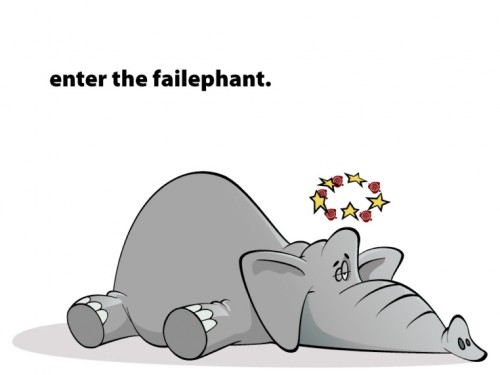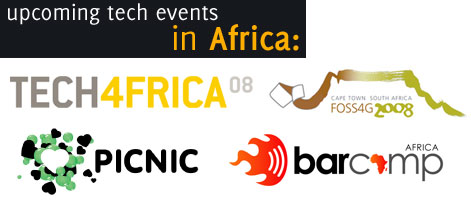[Below is my Tech4Africa talk, given today in Johannesburg, South Africa, titled “How we built Ushahidi, w]
I’m used to talking about Ushahidi, and as all of you guys who frequently talk about your product or company know: it gets old spouting off the same old stuff over and over again. That’s why I’m excited about today and for being invited to this excellent conference, since I’ll be telling the backstory, the quirks and funny bits that got us to this point and made our Ushahidi culture what it is today.
This is my story of Ushahidi – Of a small organization that dislikes hierarchy and being told what we can’t do. One that questions everything, embraces innovative thinking, takes risks boldly, and sometimes learns the hard way that we’re human after all.
In January 2008 I spent a week watching news reports roll in from Kenya, frustrated. Frustrated because I had said for years that “technology helps us overcome inefficiencies”. Wasn’t the madness of Kenya, in it’s post-election violence throws, it’s lack of media coverage, and lack of real information just this? Why was I unable to do anything?
It turned out that I needed an idea, and for once I couldn’t come up with one on my own. That seed of an idea that grew into what you see today came from a simple bullet point by my friend and fellow blogger Ory Okolloh, asking if we could map reports of violence around the country. Thus Ushahidi was born.
I’m going to walk you through three defining moments for our organization, and our platform, not all of them pretty, but which make us who we are.
1. Let’s look at the ad hoc cast that got it started:
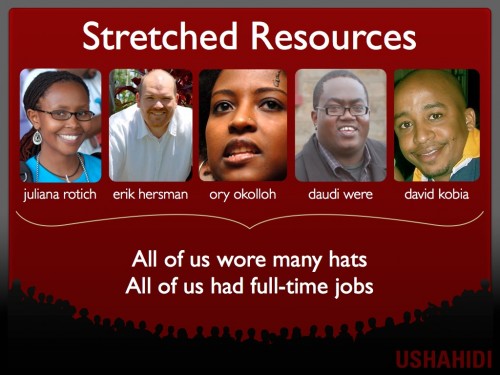
Ory Okolloh – lawyer, blogger and Kenyan political pundit
Juliana Rotich – renewable tech geek, blogger and database admin
David Kobia – developer and top Kenya forum webmaster
Daudi Were – blogger and web guy
Erik Hersman – Africa tech blogger, web guy
Others – a various cast of tech and non-tech people swarmed around the first Ushahidi deployment in Kenya, helping with small tasks and then disappearing.
Key points:
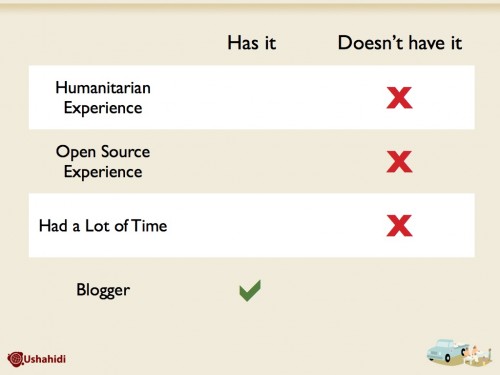
- You’ll notice that there was not a single one of us who had any humanitarian experience
- None of us had taken part in any open source project. (v1 was built in .NET)
- Most of us were self-employed, running our own businesses or consulting, and didn’t like working for big companies.
- The only common denominators that we shared was our love of our home; Kenya, and the ability to blog.
Thus, we felt we were the best placed to create an African open source platform for crowdsourcing information, our tech gift to the rest of the world.
We didn’t think of that at all actually. Instead we were madly Skyping, emailing, wireframing and coding over a 3 day period to get something up as quickly as possible.
We were brutal about every decision:
- If it wasn’t absolutely necessary, throw it out.
- Pick a name, any name, we don’t care if non-Kenyans can’t say it, just get a domain up asap
- Launch this app, it’s functional, we’ll fix bugs and features on the fly
- No one has a short code for us yet? Screw it, it’s not worth waiting, we’ll get one eventually.
- Money, what’s that for? Media budgets are overrated, we’ll blog it.
- We don’t have a logo. Oh well… Launch already!
How our team came together, the way we made those initial decisions and how we interacted and leaned on what would become our community was defining. It still colors how we operate, our organizational communications and our community focus.
Lessons learned:
- This taught us to keep a shallow and wide decision-making structure so that everyone had access to all the information about ops or platform that they desired. Anyone was empowered to make decisions, since thy understood the macro-game.
- Release code early, it’s better to have it out and being tested and worked on in the real world, than hidden away in a sandbox somewhere.
- If you want it done, build it yourself, don’t put it off onto another team member.
- Community = success
- No money, no worries. Build good stuff and good stuff happens, money follows.
2. Technology is only a tool
No background in open source projects meant that we had little experience in how to engage programmers, designers and the help needed to get things moved from that initial .NET build into an open source language. David and I were trying to decide what language to write this in, and we ended up picking PHP over Python since we thought more African programmers would be proficient in it.
David wasn’t a PHP guy (yet), so the early helpers, the volunteers like Jason Mule, Henry Addo and Chris Blow were a huge help in making the decision to go with the Kohana framework and a myriad of other decisions.
3 months later we announced v0.1 of “THE NEW AND REBUILT USHAHIDI PLATFORM!”
We were very excited, after all, wasn’t this the platform that would save the world? And we were ready to show the world just how it could be done. Gamely mounting our white steeds we charged into a deployment of Ushahidi in the troubled North Kivu region of the DR Congo.
Echoes of that failure splatting against the ground remind us still, today, of the complexities of the space we build software in. We learned from those lessons though, and Ory wrote a good blog post making sure that it was shared within and without.
Lessons learned:
- Technology is only 10% of the solution needed. The rest is administration and messaging.
- Stick to what you do well. Our team is built to build software, not be a deploying organization
- (caveat! We do help in deploying rarely, like Haiti and Kenya, but we now pass those off, or partner)
- Own your failures publicly, learn from them.
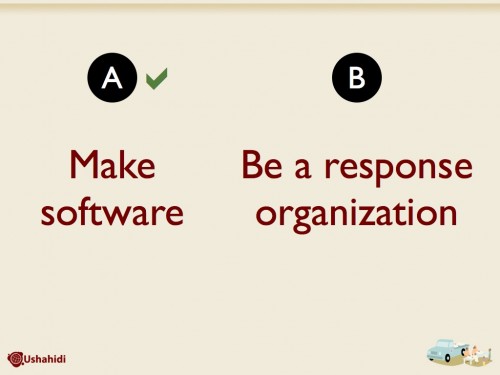
3. Enter the failephant!
Only a few months later, after the DRC debacle, we were rested and ready to fail again.
Al Jazeera had used the alpha version of the Ushahidi platform in Gaza, a group of organizations and individuals were deploying it to monitor the worlds biggest elections in Indian, and we had a number of groups in East Africa testing it out.
Our model was that we had a small team at Ushahidi whose job was to come up with and guide the core architecture of the platform. Volunteers also worked on core, but were also encouraged to extend the platform in their own ways. It was working very well, and still does.
We were ready to release the code publicly.
Before I say anything, let’s revisit that point earlier about none of us having eroded on an open source project before…
Preperations were made, blog posts were written, tweets were tweeted – and we got lambasted by one of the guys we respect a great deal in the open source community. Rabble called us out on all the things we did wong.
– The code repository was behind a user/password wall
– We weren’t available in the normal programmer channels like IRC
– Hard to plug into the rest of the dev community
Our team went to work, madly working over the next 12 hours to get our stuff straightened out. Finally I wrote another blog post, introducing our failephant mascot and apologizing for our ignorance and missteps.
Lessons Learned:
- Listen and apply that listening to real changes
- Again, own your failures. Fix things that are wrong.
- It’s okay to think different in how you execute on a project as long as you don’t stray from the spirit of your community and self
.
Finally, I’ll end with this.
We’ve learned that technology does overcome inefficiencies, but that it still takes people to make it happen.
We’ve learned that more people need to buck the status quo, that questioning everything makes us better.
We’ve learned that Africans can build world-class software, and to expect nothing less.

